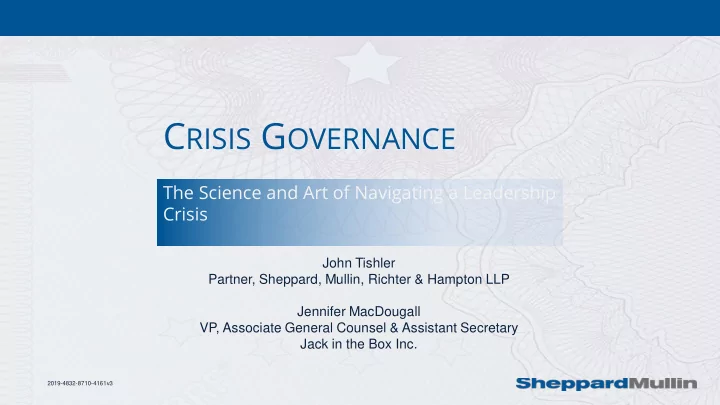

C RISIS G OVERNANCE The Science and Art of Navigating a Leadership Crisis John Tishler Partner, Sheppard, Mullin, Richter & Hampton LLP Jennifer MacDougall VP, Associate General Counsel & Assistant Secretary Jack in the Box Inc. 2019-4832-8710-4161v3
W HAT IS A C RISIS ? Any event that can have a material negative effect on the company and its stakeholders
W HAT IS A G OVERNANCE C RISIS ? A crisis that suddenly and unexpectedly disrupts the historical mechanisms of authority in an organization
E XAMPLES OF C RISES Governance Crises Other Crises That May Become Governance Crises Financial fraud Data breach External investigation by Major public relations crisis governmental authority Internal investigation of CEO or Natural disaster/violence other senior management for Safety incident improper conduct Shareholder or director deadlock Sudden death or disability of CEO Termination of CEO
W HAT HAPPENS IN A GOVERNANCE CRISIS ? Uncertainty who has authority to give instructions Contrary and contradictory instructions received Tribalism Employees lose faith and morale drops Large number of employees hit the job market Financial results suffer Lawyering up Decision-making slows to a crawl Investigation/remediation blamed for all the company’s problems
R ISK FACTORS FOR GOVERNANCE CRISIS Corporate “culture of fear” Siloed decision-making CEO perceived as Overly-aggressive sales targets untouchable/unaccountable to Unwillingness to disappoint the board “street” Weak internal controls Belief that survival of company Tolerance of circumvention of depends on elevated stock price internal controls Excessive risk taking Belief that the end justifies the means Money as organization’s sole goal Weak persons in traditional and measure of accomplishment and oversight roles recognition Corollary: departures of strong High turnover, particularly in finance, persons in oversight roles legal and HR
P REPARATION FOR A GOVERNANCE CRISIS Crisis response plans/protocols/procedures Alternative protocols/call lists for when senior leadership is compromised Effective code of ethics/training – Widely understood – Respected by senior leadership Effective whistleblower policy – Widely known – Trusted – Effective evaluation and escalation process Culture of accessibility and accountability of senior management Pre-identification of responsible body of the board – Often but not always the Audit Committee Strong leader of such body Succession planning
T YPICAL CRISIS CURVE 6 5 4 3 2 1 0 Fulgor Discovery Trigger Recognition Resolution Denouement
W HAT TO DO WHEN CRISIS OCCURS ? Consult with experts immediately Suppress instinct to put worms back in can Preserve evidence Protect whistleblowers Assemble a team for planning and execution Inside company Outside company Identify process leader(s) Assure team participants of their job security Revise lines of authority Develop a plan including key interim milestones Develop communication strategy Make decisions collaboratively/eliminate silos
K EY TEAM MEMBERS Board committee of disinterested directors Or independent overseer if no disinterested directors Legal counsel, often multiple firms Independent auditor Forensic accountant Public relations/crisis management firm Investment bank
D ECISION - MAKING CHALLENGES Routine business decisions require director oversight Directors not accustomed to making such decisions Matters under investigation overlap with ongoing operations – Conflict of investigators between investigating and making new decisions – Potential need for investigators to recuse from prior advice function Legal overlay of formerly routine business matters and encounters
W HAT TO ANTICIPATE FROM RECOGNITION TO RESOLUTION Defaults under debt and commercial Internal investigation contracts that depend on currency of Expansions of internal investigation financial statements Challenging disclosure issues; strains Exchange delisting procedures on disclosure controls and Employee departures procedures Increasing desperation of persons under Auditors declining to issue audit or investigation review opinions Lost friendships SEC/DOJ/Stock exchange investigations/enforcement actions/criminal prosecutions Shareholder and other third party lawsuits Difficult attorney-client privilege issues involving internal investigation Massive expenditures for outside advisors Activist shareholders
W HY DOES RESOLUTION TAKE SO LONG ? Persons under question often highly valued in organization – desire to retain if at all possible Situations are complex Credible investigation takes a long time – Often millions of documents to collect and review – Often dozens of interviews Third parties will focus on the quality of the investigation A poorly conducted or rushed investigation likely to lead to even longer recovery as government, plaintiffs and activists fill vacuum
B ETWEEN RESOLUTION AND DENOUEMENT Completion of delayed financial statements Restoration of good standing with stock exchange, creditors, customers Resolution of governmental investigations Resolution of plaintiff lawsuits Resolution of employee lawsuits Adjustment to new controls and oversight Replacement of older employees who do not fit in new culture
W HAT DOES DENOUEMENT LOOK LIKE ? Investigation concludes with findings and recommendations Personnel changes, often substantial Recovery of financial vitality Culture of increased oversight/adherence to rules Departure of crisis professionals
A PPROPRIATE P OSTURE /S TYLE FOR C RISIS G OVERNANCE Process-focused Available Practical Patient Self-confident Resilient Empathetic and respectful
Q UESTIONS 17
Recommend
More recommend